Sometimes art imitates even the most disagreeable parts of life. With about 10 percent of all Americans unemployed in 2009, one of the year’s most popular movies turned out to be Up in the Air, a hard-to-classify film about Ryan Bingham, played by George Clooney, who travels the country laying off employees for bosses who want to avoid confrontation. Up in the Air is one of the latest of a type of feature film that first began rolling into theaters during the Reagan years – the layoff movie.
Over the past three decades, the layoff movie has reflected the fear and loathing of employees who were victims of corporate reengineering or simply downsizing during recessions. First up was Mr. Mom, starring Michael Keaton as a man who takes on homemaking duties after being let go from his engineering job, came to theaters in 1983, just as job security, especially for white collar workers, was becoming a thing of the past.
Layoffs today may seem like standard business practice, but it wasn’t until the early 1980s that corporations began to use widespread layoffs as operating procedure. It was in 1984 that The Bureau of Labor Statistics created the Mass Layoff Statistics Program. (Prior to this time, workers were often let go during tough times with the understanding that they’d be rehired as soon as it became practicable for the company to do so).
Ryan Bingham’s job would have been unthinkable fifty years ago. Prior to World War II, lifelong employment wasn’t the norm, unless you inherited Daddy’s business. “Turnover was really high, and employees would jump from company to company,” says Peter Cappelli, George W. Taylor Professor of Management at the University of Pennsylvania’s Wharton School. Post-1945, the labor market evolved. “Unions and other organizations helped create systems that maintained employees with companies for life,” says Cappelli.
Jump to the early 1980s when a severe recession, burgeoning globalization and a shift in expectations created a perfect storm of workplace destabilization. “There was a general sense that employers were under siege from foreign competition and that government should do whatever it could to help them. So policies weakened the role of unions, but it was more that we shouldn’t expect firms to look out for their workers because they now had their own problems,” says Cappelli.
The sea change came when a company known for its loyalty to employees finally caved. “The defining moment was probably when IBM announced it was laying off workers,” says Cappelli. “The sense was, if IBM is doing that, with its history of no layoffs even in the Depression, we should as well.”
That was in 1993. Leading up to that point, films such as Michael Moore’s Roger and Me (1989), about the decline and fall of Flint, Mich., as its auto manufacturing jobs were outsourced to other countries, and Falling Down (1993), in which Michael Douglas’ character implodes soon after losing his job as a defense engineer, helped to drive the point home.
Keep reading for a list of 10 layoff movies from the past three decades.
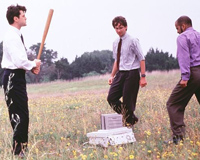 Office Space (1999): The movie that brought “flair” and “a case of the Mondays” into the American vernacular takes a decidedly contemptuous view of modern office culture. A group of disillusioned suburban office workers hatch a penny-shaving scheme, while their company brings in outside consultants to implement a cost-cutting program that will include a round of layoffs. Protagonist Peter Gibbons’ indifference to the entire process paradoxically results in a promotion.
Office Space (1999): The movie that brought “flair” and “a case of the Mondays” into the American vernacular takes a decidedly contemptuous view of modern office culture. A group of disillusioned suburban office workers hatch a penny-shaving scheme, while their company brings in outside consultants to implement a cost-cutting program that will include a round of layoffs. Protagonist Peter Gibbons’ indifference to the entire process paradoxically results in a promotion.
Memorable quote:
Peter Gibbons: “What if we're still doing this when we're fifty?
Samir: It would be nice to have that kind of job security.
 Up in the Air (2009): The great recession’s greatest manifestation on film. The plot follows defiant loner Ryan Bingham (George Clooney) as he travels around the country doing his job, which is to terminate the jobs of others. Director Jason Reitman cast real people who had lost their jobs as the newly laid off to infuse the movie with a dose of the realities afflicting the country at the time of the film’s release.
Up in the Air (2009): The great recession’s greatest manifestation on film. The plot follows defiant loner Ryan Bingham (George Clooney) as he travels around the country doing his job, which is to terminate the jobs of others. Director Jason Reitman cast real people who had lost their jobs as the newly laid off to infuse the movie with a dose of the realities afflicting the country at the time of the film’s release.
Memorable Quote:
Man 3: On the stress level, I've heard that losing your job is like a death in the family but personally I feel more like the people I work with were my family and I died.
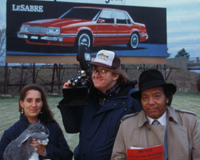 Roger and Me (1989): Michael Moore’s first film explores the collapse of Flint, Michigan’s economy with an unabashed sympathy for laid off auto factory workers. Unlike most of the other films on this list, Roger and Me deals with working class unemployment – in the 1980s, General Motors closed a number of plants in Flint, leading to the dissolution of tens of thousands of jobs and wreaking economic havoc on the city, a plundering from which it never recovered.
Roger and Me (1989): Michael Moore’s first film explores the collapse of Flint, Michigan’s economy with an unabashed sympathy for laid off auto factory workers. Unlike most of the other films on this list, Roger and Me deals with working class unemployment – in the 1980s, General Motors closed a number of plants in Flint, leading to the dissolution of tens of thousands of jobs and wreaking economic havoc on the city, a plundering from which it never recovered.
Memorable Quote:
Newscaster: “The 1,800 hourly workers at this plant were sent home with flowers today … One worker told me, you know when they send you flowers? When you die.”
 Mondays in the Sun (Spain, 2002): Another day, another dying industrial town, this time in northern Spain. Javier Bardem stars as Santa, one of a group of men who gather daily at a local bar to commiserate and try to forget their shared predicament. He dreams of moving to Australia in search of a better life as his former employer sues him for breaking a light in its factory.
Mondays in the Sun (Spain, 2002): Another day, another dying industrial town, this time in northern Spain. Javier Bardem stars as Santa, one of a group of men who gather daily at a local bar to commiserate and try to forget their shared predicament. He dreams of moving to Australia in search of a better life as his former employer sues him for breaking a light in its factory.
Watch the trailer here.
 The Company Men (2010): Scheduled for release later this year, The Company Men stars Ben Affleck as a successful white collar businessman who falls victim to a round of corporate downsizing. He finds work with his blue collar brother-in-law, played by Kevin Costner, and reconsiders the goalposts that had formerly defined his life. The film was a hit at Sundance this year, where it generated some early Oscar buzz.
The Company Men (2010): Scheduled for release later this year, The Company Men stars Ben Affleck as a successful white collar businessman who falls victim to a round of corporate downsizing. He finds work with his blue collar brother-in-law, played by Kevin Costner, and reconsiders the goalposts that had formerly defined his life. The film was a hit at Sundance this year, where it generated some early Oscar buzz.
Watch the trailer here.
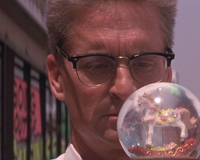 Falling Down (1993): Michael Douglas plays a man who crumbles in dramatic fashion under the pressures of modern life over the course of a day in Los Angeles. It’s not until partway through the film that the audience learns he has recently been let go from his job as a defense engineer. Perhaps more than any other film on this list, Falling Down epitomizes the debilitating effect that a layoff can have on a man’s sense of self-worth (A recent New York Times article suggested that men take layoffs much harder than women.)
Falling Down (1993): Michael Douglas plays a man who crumbles in dramatic fashion under the pressures of modern life over the course of a day in Los Angeles. It’s not until partway through the film that the audience learns he has recently been let go from his job as a defense engineer. Perhaps more than any other film on this list, Falling Down epitomizes the debilitating effect that a layoff can have on a man’s sense of self-worth (A recent New York Times article suggested that men take layoffs much harder than women.)
Memorable quote:
William Foster: I am not economically viable.
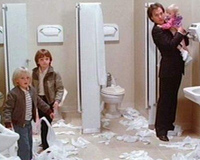 Mr. Mom (1983): A Detroit-area family man loses his job as an engineer for one of the big automakers during the recession of the early 1980s, leading his formerly say-at-home wife to accept a position at an advertising agency while he assumes the responsibilities of homemaker and nanny. The expected hijinks ensue: The husband struggles to accomplish all of the chores the wife completed with aplomb, while the wife thrives in her new position. Mr. Mom is the rare film that examines auto-industry job loss from the perspective of a white-collar worker.
Mr. Mom (1983): A Detroit-area family man loses his job as an engineer for one of the big automakers during the recession of the early 1980s, leading his formerly say-at-home wife to accept a position at an advertising agency while he assumes the responsibilities of homemaker and nanny. The expected hijinks ensue: The husband struggles to accomplish all of the chores the wife completed with aplomb, while the wife thrives in her new position. Mr. Mom is the rare film that examines auto-industry job loss from the perspective of a white-collar worker.
Memorable quote:
Jinx: You're not exactly walking out of here empty handed. You got your pension and I'll give you this month's gas money.
Larry: There's only one more thing I want.
Jinx: What?
Larry: Disability!
Jinx: Hey keep that sense of humor, it'll do you good.
 Glengarry Glen Ross (1992): Sometimes, people will do whatever it takes to hold onto their jobs – even break the law. That’s what happens when a group of real estate salesmen are informed that in one week’s time, all but the two best among them will be let go. Deception, begging, burglary and arrests ensue. The kill-or-be-killed nature of the situation exposes each man’s insecurities, weaknesses and in some cases, ruthlessness.
Glengarry Glen Ross (1992): Sometimes, people will do whatever it takes to hold onto their jobs – even break the law. That’s what happens when a group of real estate salesmen are informed that in one week’s time, all but the two best among them will be let go. Deception, begging, burglary and arrests ensue. The kill-or-be-killed nature of the situation exposes each man’s insecurities, weaknesses and in some cases, ruthlessness.
Memorable quote:
Levine: You’re gonna fire the bottom men on the list?
Williamson: That’s the way it is and I don’t make the rules. The rules come from downtown.
 L'emploi du Temps (France, 2001): Released under the title Time Out in the United States, this French film’s protagonist goes to great lengths to hide his layoff from family and friends. His web of lies results in a tangle of deceit. In order to keep the lies going, he eventually gets involved in an investment scam and smuggling ring. L’emploi du Temps exemplifies the shame involved for many workers in the reality of a layoff.
L'emploi du Temps (France, 2001): Released under the title Time Out in the United States, this French film’s protagonist goes to great lengths to hide his layoff from family and friends. His web of lies results in a tangle of deceit. In order to keep the lies going, he eventually gets involved in an investment scam and smuggling ring. L’emploi du Temps exemplifies the shame involved for many workers in the reality of a layoff.
Watch the trailer here.
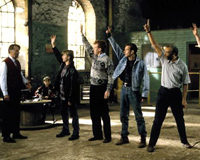 The Full Monty (1997): Six unemployed men in the dying northern English steel town of Sheffield take it all off in a Chippendales-inspired scheme to meet their respective financial obligations. The lighthearted nature of their striptease belies the depression, struggle and hopelessness that have come to define these men’s lives. Indeed, marriages buckle, a father struggles to maintain his son’s respect, and one character attempts suicide.
The Full Monty (1997): Six unemployed men in the dying northern English steel town of Sheffield take it all off in a Chippendales-inspired scheme to meet their respective financial obligations. The lighthearted nature of their striptease belies the depression, struggle and hopelessness that have come to define these men’s lives. Indeed, marriages buckle, a father struggles to maintain his son’s respect, and one character attempts suicide.
Memorable quote:
Gaz: You’re not our foreman anymore. You’re just like the rest of us: scrap.




